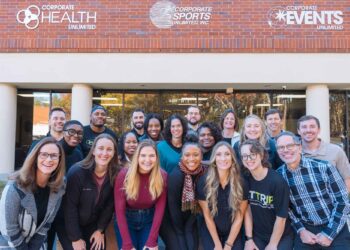They say you can’t teach an old dog new tricks, but what about personal trainers? Unlike canines, fitness professionals are perfectly capable of learning long after their initial certification. This is why fitness professionals of all experience levels should consider pursuing continuing education credits (CECs).
Fitness CECs are courses — in a live setting or online — for trainers and other industry professionals that help them retain licenses or simply expand their knowledge.
Many experts in the industry view CECs as a necessity, not just a commodity. “It’s not just important — it’s essential,” said Vic Spatola, the director of personal training at Greenwood Athletic and Tennis Club. “By getting more CECs, we’re expanding our knowledge base, knowing why certain exercises are good for you, why certain training methods might not be, and how we can help members achieve the results they want.”
It’s extremely beneficial for trainers to broaden their understanding of basic fitness techniques, but this principle can apply to any career path.

“If you look at any profession — even outside of the fitness industry — there are usually continuing education requirements, and I think the reason is to keep practitioners engaged in their profession,” said Jeff Halevy, the owner and CEO of Halevy Life.
And every gym owner knows more engaged trainers means optimized member experiences. “I’ve found just the experience of continuing education tends to fire trainers up — it’s a reinvigoration process,” said Chris Cygul, the owner of St. Augustine Fitness. “They tend to have a renewed passion for what they’re doing for a living, so they come back from the courses and share their experiences with their clients.”
Part of those experiences is an evolving understanding of the human body and how that understanding helps trainers best operate in an evolving industry.
“I think it’s required so you can keep the individual sharp — it’s just so important to really flow with the research and new understandings we have of the human body,” said Halevy. “If you’re not continuously putting yourself in environments that expose you to this education and understanding, it can become challenging to stay up-to-date with these new developments.”
We all know continuing education is extremely beneficial, but with so many CECs on the market, the choice can become overwhelming for trainers and professionals. According to Spatola, the decision will be different for each individual.
“It really depends on the trainer, specifically their experiences and what their focus is going to be,” said Spatola. “Trainers should focus on something they’re passionate about and that interests them. They also need to look at what their clientele base is going to benefit from.”
In other words, a trainer with any level of experience needs CECs that will meet their interests while providing what their clients need. “They need something that balances out their passion and your business, by delivering training for your current clientele and who you’re looking to get,” said Spatola. “That’s what an experienced trainer needs to focus on.”
They say variety is the spice of life, so your trainers shouldn’t be devoting too many resources to a training method they’re already good at. For example, a cycling specialist should consider taking some education courses on functional movement, strength training or anything else they could learn more about.
“I think it makes a lot of sense for [trainers] to seek out anything that’s an alternate from a training strategy you’re currently employing,” said Halevy. “They say the best program is the one you’re not currently running.”
The best way to maximize the effectiveness of your training staff is to have your trainers pursue a more well-rounded understanding of fitness. “If you focus on something new, you’ll probably get exposed to some pretty cool stuff that will enhance and change your strategy, and give you a more in-depth understanding of what you currently do,” said Halevy.
Once trainers have decided what types of CECs they want to pursue and clients they want to help with that training, there’s still a plethora of specialized courses to choose from.
“I particularly like what TRX is doing with functional training,” said Cygul. “TRX offers a functional training course (FTC) and I really like how in-depth the material is and how lengthy the material is. We dive into all the foundational movements and how they apply to multiple modalities.”
According to Cygul, the FTC course has enhanced his trainers’ abilities to improve their clients’ movements in a variety of ways. “Whether trainers have clients on a BOSU ball, TRX suspension trainer, RIP trainer, kettlebells or sandbags, it’s really about getting them to understand how to apply functional movements to those modalities,” said Cygul.
At Greenwood, Spatola and his trainers have found a lot of success learning from Gray Cook’s functional movement screenings (FMS). “The FMS is a great one that gives you a qualified measure of how flexible a person can be,” he said. “I like those because [many] people deal with an inability in range of movement, whether it’s upper or lower body. If we can get people to move more freely and not be so restricted in how they move, their lives are going to be much better.”
Improving movement is a big focus at Halevy Life, as well. “Anything that focuses on mobility is probably pretty useful,” said Halevy. “Most of us know how to get someone stronger, but truly understanding mobility is very important.”
The science of mobility in fitness is evolving, which means new CECs focusing on movement and mobility are growing more popular in the industry.
“Andreo Spina’s function range conditioning is fantastic for mobility,” said Halevy. “Joel Jamieson’s work is fantastic as well. He’s got something called ‘Eight Weeks Out’ and it’s all about energy development.”
While it might not be a traditional marketing tactic, actively pursuing new CECs is a fantastic way to indirectly increase foot traffic for your club. Knowing the best movements for members and trending exercises will show current and prospective members you’re proactive in expanding your training options.
“You have to know if a new trend is going on, because if you don’t, your clients will,” said Spatola. “The internet has given us a slew of information, and if we aren’t staying on top of the current new modalities, methods of training and new philosophies, we’re done.”
As members continue to seek an all-encompassing fitness experience, it’s incumbent on health clubs and trainers to possess all the education they need to help those members achieve their fitness goals. And that knowledge is rooted in CECs.
“We make sure we’re really applying what we’re learning and continuing to stay on top of our education,” said Cygul. “We may attend a course, but it doesn’t end there — we continue to adjust what we’re doing, so no two days in our studios are ever the same.”
Trainers should get CECs that expand their knowledge of fitness instruction, for the sake of helping differentiate themselves and their club from the rest, or simply developing a more complete understanding of their profession.
“Members shouldn’t be going somewhere besides your club for specialty training or services,” said Spatola. “We need to bring that knowledge and education into our clubs with whatever specialties trainers are passionate about.”
Stay ahead in the fitness industry with exclusive updates!
Bobby is the former assistant editor of Club Solutions Magazine.






![From Client to CEO: Bryan Myers and the Rise of [solidcore]](https://d296qbqev3kq48.cloudfront.net/wp-content/uploads/2025/11/06151333/CS-NovDec25-CoverStory-3-350x250.jpg)


